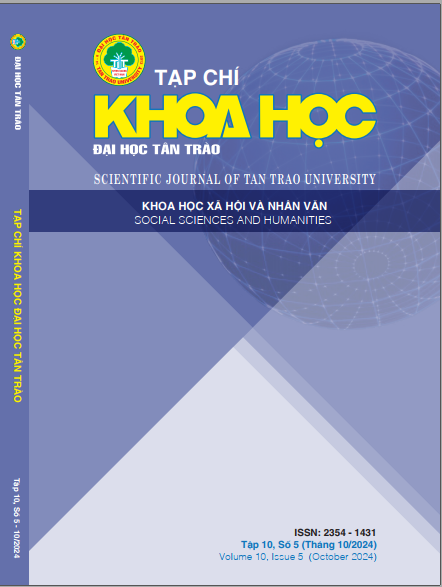MỘT SỐ GIẢI PHÁP TĂNG CƯỜNG THU HÚT VỐN ĐẦU TƯ CHO PHÁT TRIỂN DU LỊCH TỈNH TUYÊN QUANG TRONG GIAI ĐOẠN HIỆN NAY
DOI:
https://doi.org/10.51453/2354-1431/2024/1270Tóm tắt
Những năm gần đây, nhờ chính sách đổi mới, mở cửa của Đảng và Nhà nước, cùng với xu hướng toàn cầu hóa và hội nhập kinh tế quốc tế ngày càng nhanh ở hầu hết các quốc gia trên thế giới, ngành du lịch Việt Nam nói chung và ngành du lịch của tỉnh Tuyên Quang nói riêng cũng có những bước tiến nhất định và ngày càng có tác động tích cực hơn đến nhiều lĩnh vực của đời sống kinh tế - xã hội đất nước. Với mục tiêu đưa du lịch trở thành một ngành kinh tế mũi nhọn của địa phương trong tương lai, việc thu hút vốn đầu tư cho phát triển du lịch là hết sức cần thiết và phải có sự phối hợp đồng bộ giữa các ngành, các cấp trong việc thực hiện những chiến lược nhằm thúc đẩy ngành du lịch phát triển nhanh, cân đối và bền vững.
Tải xuống
Tài liệu tham khảo
Department of Culture, Sports and Tourism of Tuyen Quang province. Report on the implementation of the tourism development program of Tuyen Quang 2010 - 2025.
National Assembly of the Socialist Republic of Vietnam (2017). Law on Tourism. Law No. 09/2017/QH14.
National Assembly of the Socialist Republic of Vietnam (2014). Investment Law. Law No. 67/2014/QH13.
Nguyen Thi Nguyen Hong (2020). Tourism Economics Textbook. Statistical Publishing House
People's Committee of Tuyen Quang province. Approving the adjustment of the master plan for tourism development in Tuyen Quang province to 2020 and supplementing the plan to 2025; Decision approving the master plan for tourism development in Tuyen Quang province to 2020, with a vision to 2030.
http://www.vietnamtourism.gov.vn/
Tải xuống
Đã Xuất bản
Cách trích dẫn
Số
Chuyên mục
Giấy phép

Tác phẩm này được cấp phép theo Giấy phép Quốc tế Creative Commons Attribution-ShareAlike 4.0 .
Bài báo được xuất bản ở Tạp chí Khoa học Đại học Tân Trào được cấp phép theo giấy phép Ghi công - Chia sẻ tương tự 4.0 Quốc tế (CC BY-SA). Theo đó, các tác giả khác có thể sao chép, chuyển đổi hay phân phối lại các bài báo này với mục đích hợp pháp trên mọi phương tiện, với điều kiện họ trích dẫn tác giả, Tạp chí Khoa học Đại học Tân Trào và đường link đến bản quyền; nêu rõ các thay đổi đã thực hiện và các nghiên cứu đăng lại được tiến hành theo cùng một bản quyền.
Bản quyền bài báo thuộc về các tác giả, không hạn chế số lượng. Tạp chí Khoa học Tân Trào được cấp giấy phép không độc quyền để xuất bản bài báo với tư cách nhà xuất bản nguồn, kèm theo quyền thương mại để in các bài báo cung cấp cho các thư viện và cá nhân.
Mặc dù các điều khoản của giấy phép CC BY-SA không dành cho các tác giả (với tư cách là người giữ bản quyền của bài báo, họ không bị hạn chế về quyền hạn), khi gửi bài tới Tạp chí Khoa học Đại học Tân Trào, tác giả cần đáp ứng quyền của độc giả, và cần cấp quyền cho bên thứ 3 sử dụng bài báo của họ trong phạm vi của giấy phép.






